Unmarked speed breakers are putting city motorists at risk across most arterial roads; experts say two- and three-wheelers most at risk
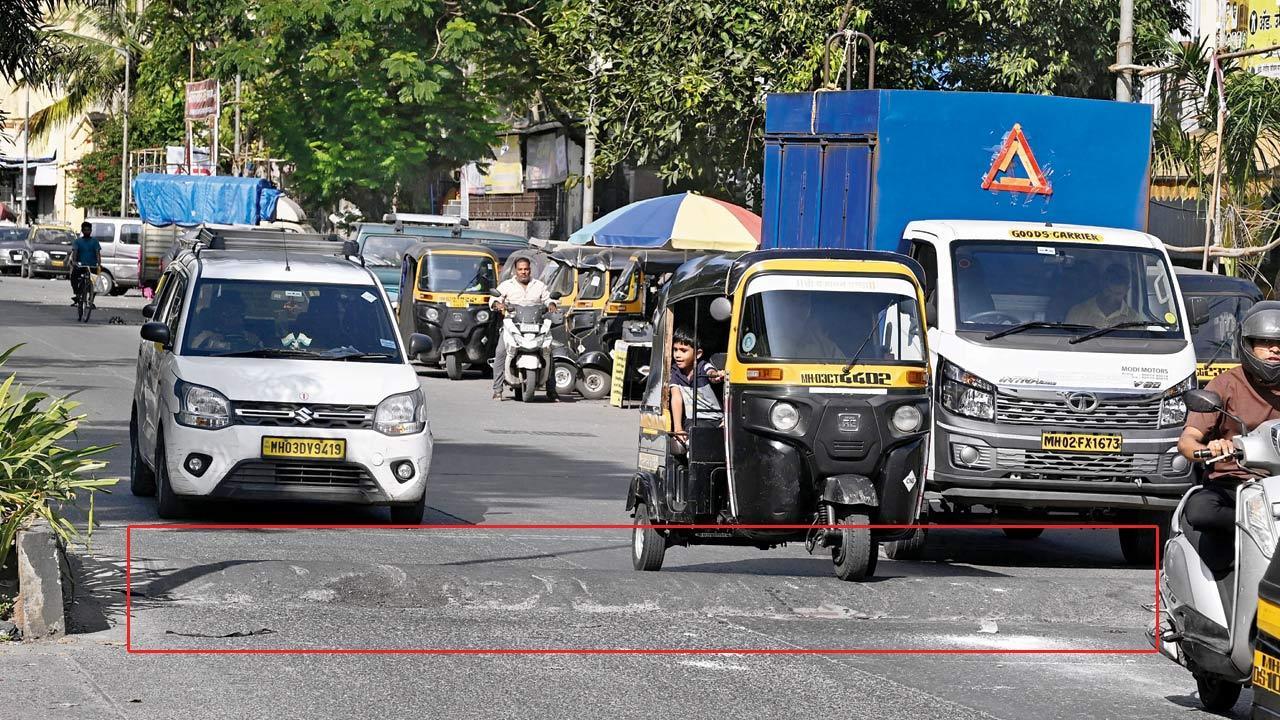
An unmarked speed breaker outside Kurla court on LBS Road. Pic/Ashish Raje
 Mumbai’s bustling roads face a silent menace—speed breakers that are either poorly marked or entirely unmarked, turning crucial safety measures into accident hotspots. While designed to slow down vehicles, these improperly maintained speed breakers are creating more problems than they solve, particularly for two-wheeler riders and motorists navigating the city’s traffic. A recent mid-day survey revealed a concerning number of unmarked speed breakers in the city’s major arteries, increasing the likelihood of accidents, especially at night.
Mumbai’s bustling roads face a silent menace—speed breakers that are either poorly marked or entirely unmarked, turning crucial safety measures into accident hotspots. While designed to slow down vehicles, these improperly maintained speed breakers are creating more problems than they solve, particularly for two-wheeler riders and motorists navigating the city’s traffic. A recent mid-day survey revealed a concerning number of unmarked speed breakers in the city’s major arteries, increasing the likelihood of accidents, especially at night.
ADVERTISEMENT
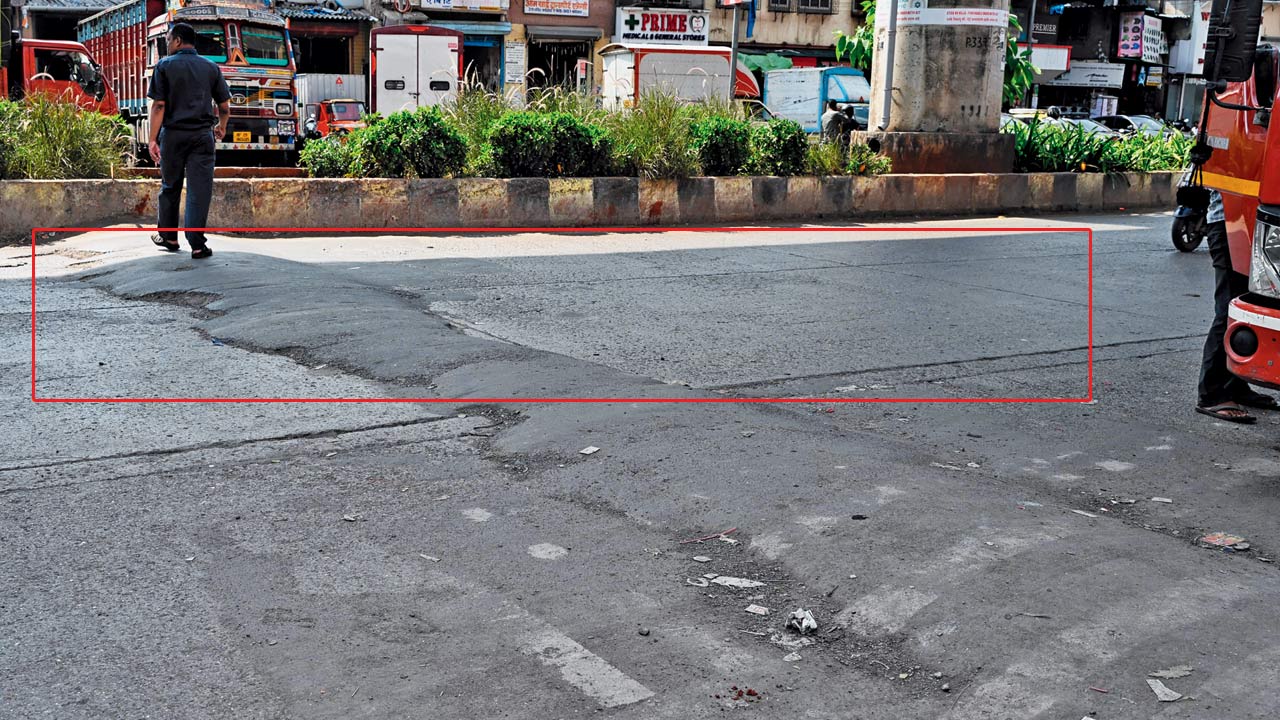
mid-day filed a Right to Information (RTI) query to obtain data on road accidents, fatalities and injuries in Mumbai between 2013 and 2023. In response, the Mumbai Traffic Police provided data from 2013 to 2021. Between 2013 and 2021, a total of 4,514 people died in road accidents in Mumbai—3,780 men and 734 women. Shockingly, 2,326 (51 per cent) of these victims were pedestrians, followed by 1,142 (25 per cent) bikers and 493 pillion riders. Additionally, 190 car drivers and 111 co-passengers were killed.
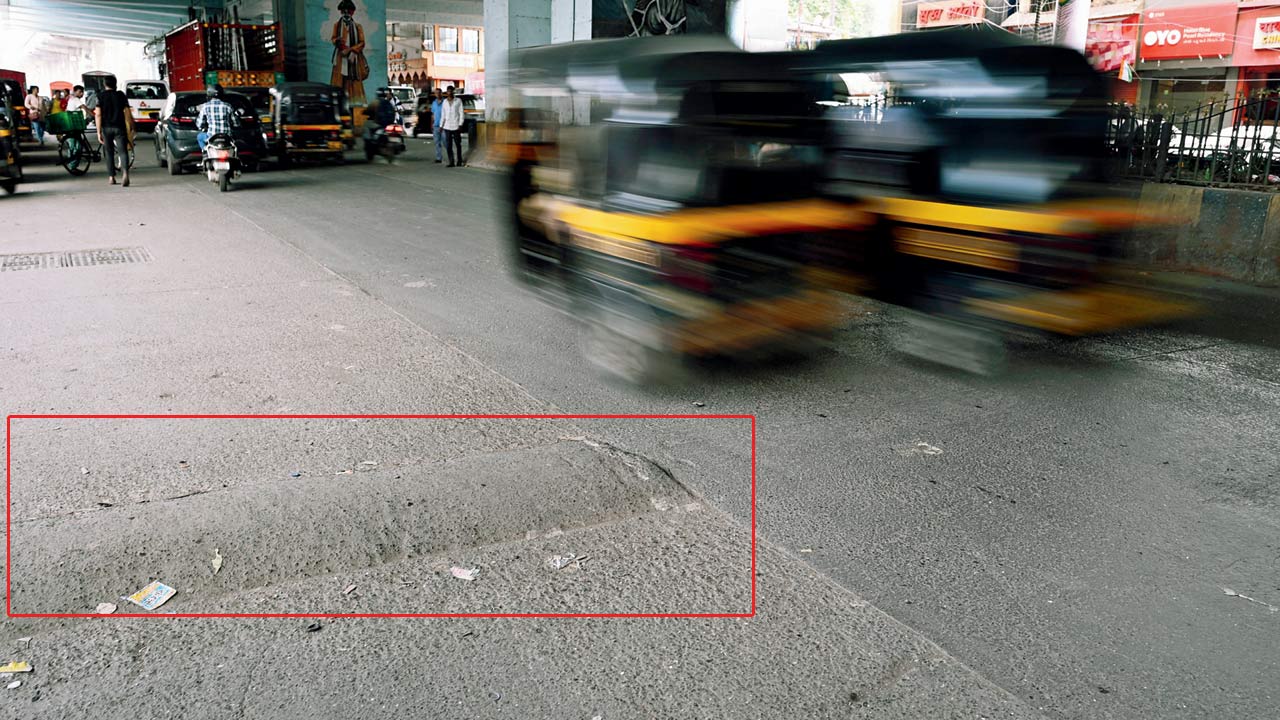
An autorishaw whizzes by a barely visible speed breaker on the Andheri-Ghatkopar Road. PIC/NIMESH DAVE
Western Suburbs
Lokhandwala Back Road – Andheri West
During a visit to the Lokhandwala Back Road in Andheri West, we noticed that the speed breakers on the route towards the Oshiwara depot signal via Millat Nagar lacked visible white markings. This makes it challenging for two-wheeler riders and motorists to safely navigate the area.
Residents have expressed concerns and believe the BMC should prioritise painting the speed breakers with visible white stripes to enhance night-time visibility and help prevent accidents.
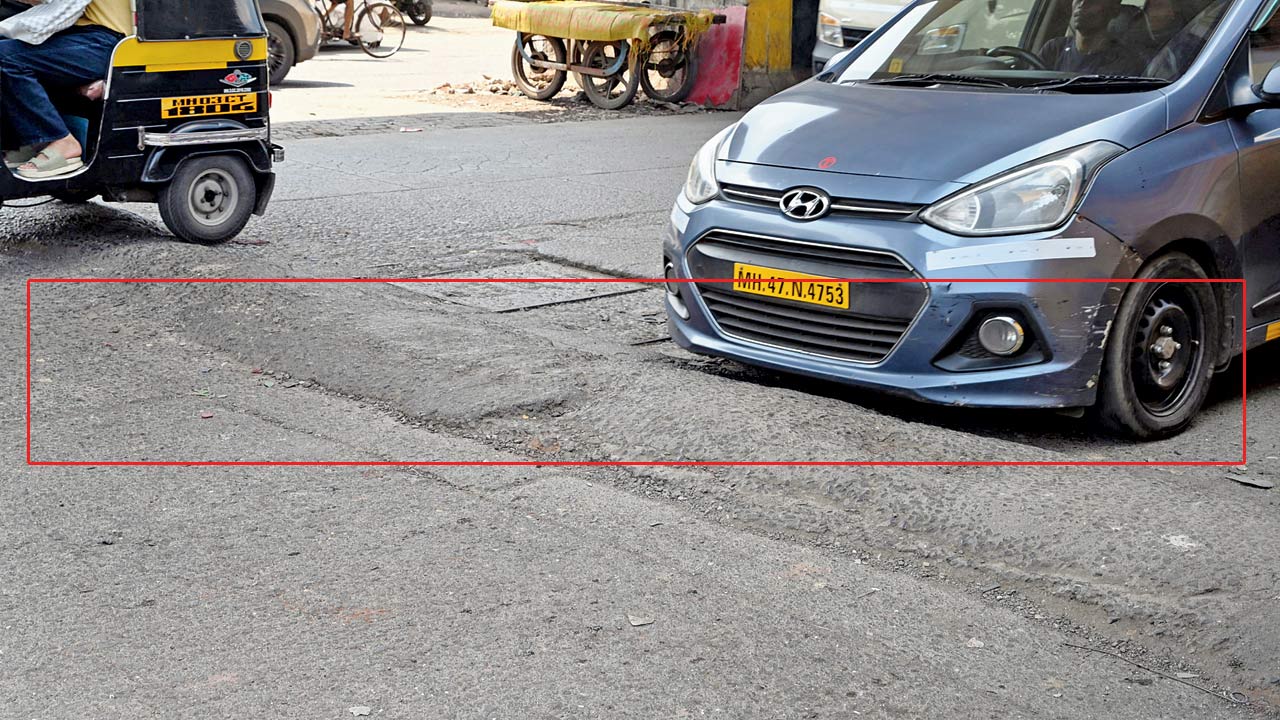
Unmarked and damaged speed breakers on the Andheri-Ghatkopar Road between the Saki Naka and Asalpha Metro Blue Line 1 stations. PICs/NIMESH DAVE
Senior citizen Yatindra Pal, a Lokhandwala resident, voiced concern about the stretch leading to the Oshiwara Link Road junction, pointing out that the speed breakers lack visible markings, which can cause vehicle damage and pose risks, especially to seniors like himself.
Karan Jotwani, founder of Buddy Riders and a Lokhandwala resident, added that while the BMC has installed signage for speed breakers, many on the back road towards Millat Nagar and Oshiwara are difficult to see.
“This poor visibility has caused cyclists to trip and injure themselves,” Jotwani said, criticising the quality of paint used. “Cheap acrylic paints are applied instead of durable reflective coatings, causing the markings to wear off within ten days. Polyurethane coatings, as specified by the Indian Road Congress, should be used,” he emphasised.
Aarey Milk Colony Internal Road
During a visit to the internal road in Aarey Milk Colony, from the VIP Guest House junction towards the New Zealand Hostel and towards Western Express Highway (WEH) from the internal road, we observed that the speed breakers lacked white markings. This makes it difficult for two-wheeler riders and motorists to see them, increasing the risk of accidents.
In the past, mid-day reported on how many internal roads in Aarey Milk Colony suffer from non-operational street lights and unmarked speed breakers, further elevating the danger for vehicles needing to apply emergency brakes when approaching these obstacles.
Aditya Shinde, a resident of Aarey, said, “The internal road from New Zealand Hostel to Goregaon exit of WEH is frequently used, and the non-operational street lights combined with unmarked speed breakers make it dangerous.”
Saki Naka to Asalpha – Ghatkopar-Andheri Link Road
On the Ghatkopar-Andheri Link Road, between Saki Naka and Asalpha Metro stations, there are at least three speed breakers on a 1 km stretch, all of which are damaged and unmarked. This has caused confusion for motorists. Rickshaw drivers report that the speed breakers often damage vehicles, especially at night when they are not visible from a distance. Tausif Siddique, a Saki Naka resident, noted, “These speed breakers are huge and unmarked, confusing motorists, especially bikers and three-wheeler drivers. At night, they become particularly dangerous.”
Danger zones
City
Naigaon
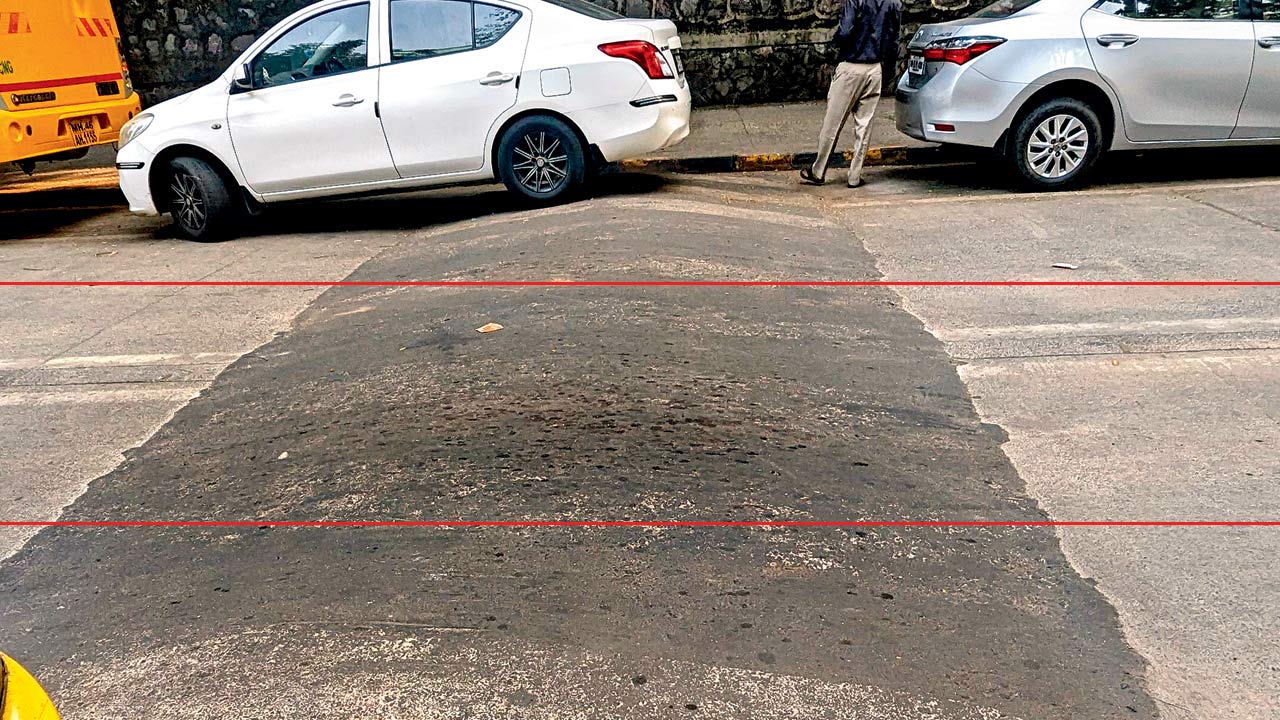
There is a huge, partially marked speed breaker near the BMC Labour Camp on Mumbai Marathi Granth Sangrahlaya Road. “The speed breaker here is very high and uneven. Motorists and two-wheeler riders have been facing problems negotiating it, and we have complained to the BMC and the traffic police several times,” said Rugved Kanade. “These bumps are painful on the back and create difficulties when senior citizens ride pillion on two-wheelers. The height of this speed breaker needs to be reduced,” added a resident.
Matunga
In Matunga East, there is a lane between ICT (UDCT) and Don Bosco school that has two large speed breakers, which are poorly designed. “The speed breakers may be necessary, but they are badly constructed. They scrape the chassis of cars even when driven over at a very slow speed,” said activist Gaurang Damani.
Near Badhwar Park, Colaba
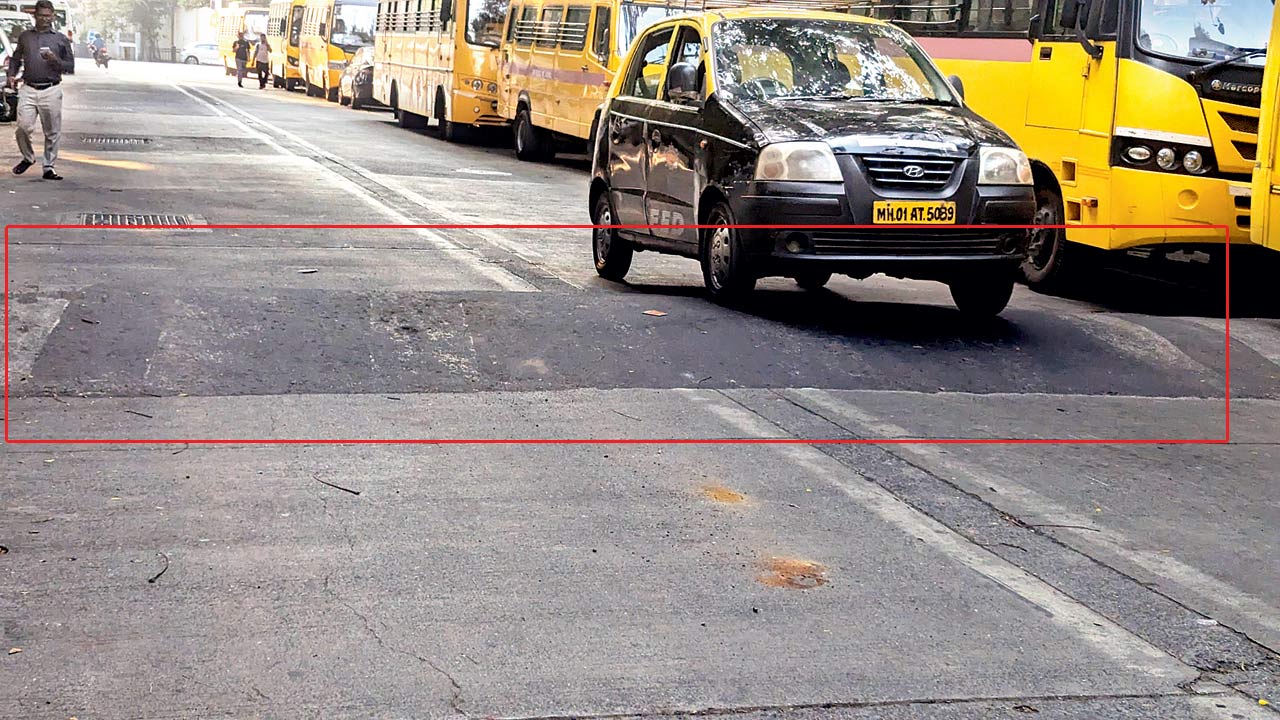
The markings on the speed breaker near Don Bosco school in Matunga have faded. Pic/Rajendra B. Aklekar
There are speed breakers on both sides of the main road at the entry gate of the railway colony at Badhwar Park. While they do help slow down vehicles, they are unmarked and cover only the central part of the road, causing bikers and two-wheeler riders to swerve and avoid them. “The speed breakers should cover the entire road, not just the traffic lanes. Two-wheeler riders skip them and speed away. Our fishermen’s colony is right along the stretch, and there are children and women walking here, which makes it risky,” said Surya Gaokar, a local resident.
Near Sassoon Dock
The speed breaker near Sassoon Dock Road in Colaba is another example of an incomplete speed breaker. It was once marked, but the paint has almost worn out, making the markings barely visible at night. “The speed breaker needs to be repainted. In fact, all the speed breakers on the Colaba stretch need a complete makeover and fresh paint so they are clearly visible. Also, they don’t cover the entire road, leaving gaps for bikers to pass through,” said Sagun Shah, a resident.
3rd Pasta Lane, Colaba
The smaller lanes of Colaba have rubber speed bumps which are not only ideal but are also broken. These were installed quickly, but due to poor maintenance, many are now broken, turning them into danger zones rather than safety features. “The small yellow strips are broken in places, and two-wheelers get stuck in them if they are at speed. You can’t even bypass them. They’re not just danger zones, but they also damage vehicles and tyres,” said local resident Anmol Khande.
Specifications
The Indian Road Congress recommends speed breakers should have a radius of 17 metres, a height of 10 cm and a width of 3.7 metres to maintain a vehicle speed of 25 kmph for the general traffic. “There are specifications for the size of speed breakers based on the road size. Speed breakers are usually constructed at pedestrian crossings. However, all speed breakers must be painted like zebra crossings so they are visible to motorists and avoid last-minute confusion,” said Girish Arekar, a council member of the Indian Road Congress.
Eastern Suburbs
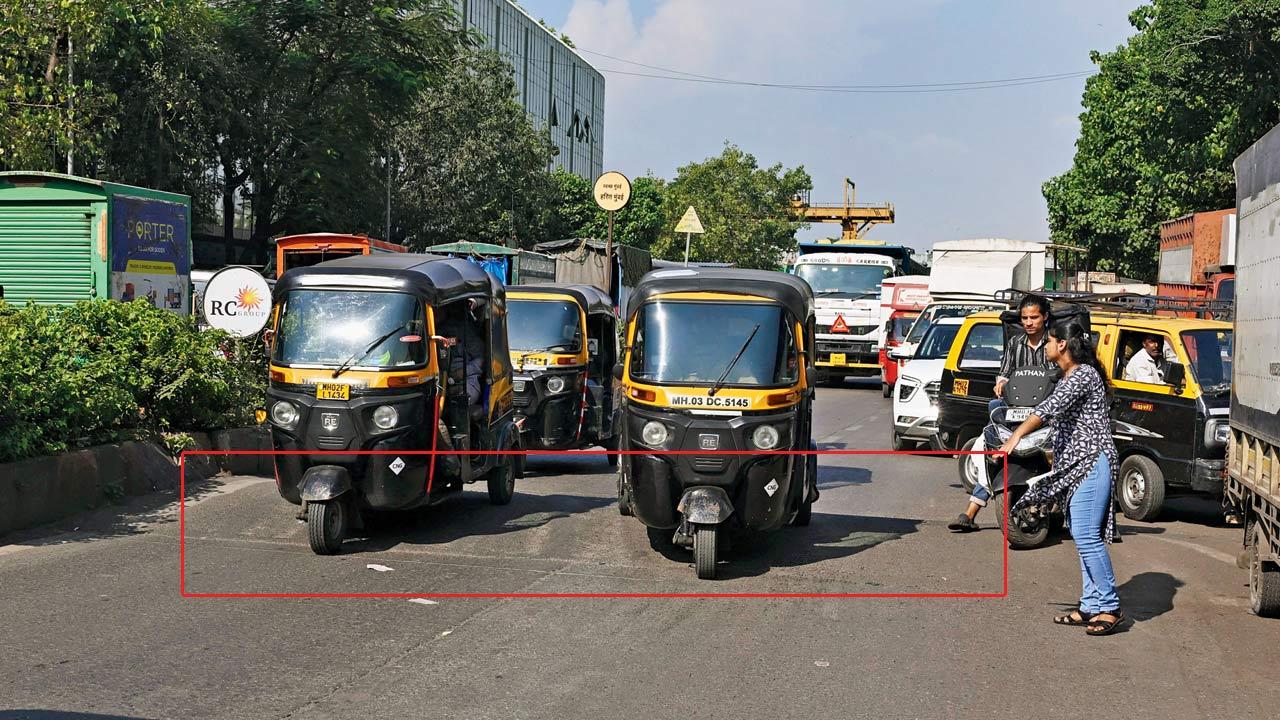
An unmarked speed breaker outside Kurla depot on LBS Road.PIC/ASHISH RAJE
Outside Ghatkopar depot
The road opposite Ghatkopar depot is part of the Ghatkopar-Andheri Link Road. Currently, work on the Ghatkopar West Connector is underway on this road. The speed breaker opposite the entrance to the Ghatkopar depot is badly damaged, and there are no markings on it. Sachin Manjrekar, a resident of Ghatkopar’s Pant Nagar, said, “The speed breakers at Ghatkopar depot are in poor condition. Now, the road has become narrower due to the ongoing work on the connector. I saw some bikers struggling as the speed breaker is not visible, even from a short distance, causing them to lose balance.”
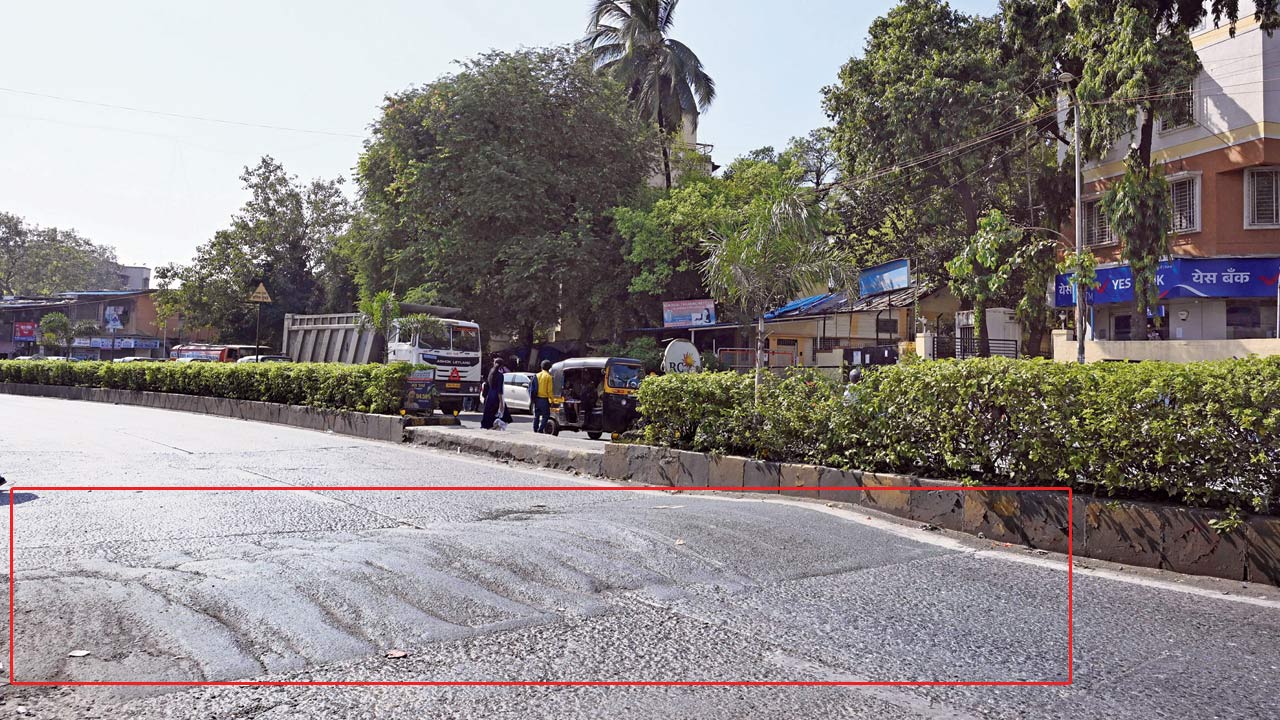
Kurla LBS Road
Lal Bahadur Shastri Road (LBS Road) is the main road in the eastern suburbs, but in Kurla, damaged and unmarked speed breakers create a terrible driving experience, especially between Phoenix Market City and Kurla Court. There are around seven speed breakers along the 4 km stretch, all of them damaged and unmarked. One biker told mid-day on condition of anonymity, “I regularly travel from Ghatkopar to Sion via LBS Road. There are speed breakers only in Kurla. These speed breakers are large and unmarked. Since I use this road often, I’m aware of their locations, but at night, motorists get confused because they are not visible.”
Dharavi-Sion-Bandra Link Road
There are two large speed breakers on Sion-Bandra Link Road between Maharashtra Nature Park and Dharavi BEST depot. These speed breakers are not marked. Locals mentioned that the speed breakers were marked in the past, but the markings have faded. At night, motorists struggle to spot these speed breakers, increasing the risk of accidents.
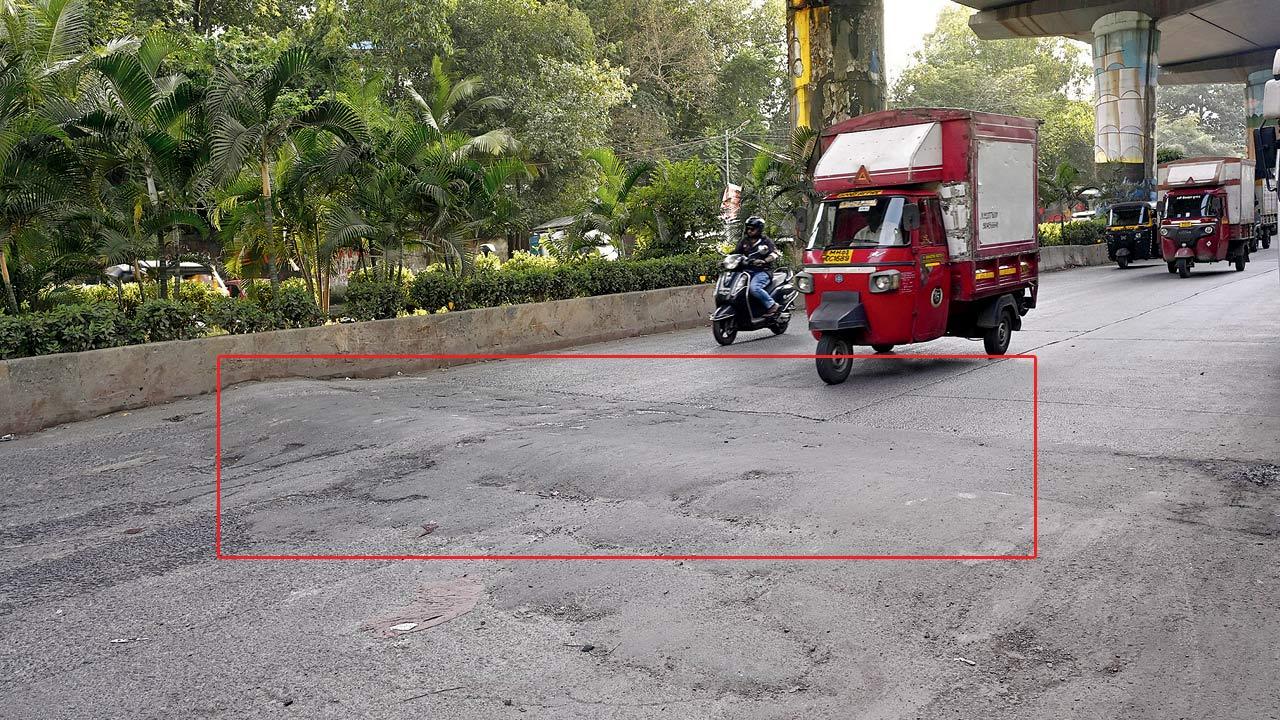
An out-of-shape speed breaker lacking visible markings near Sarvodaya hospital in Ghatkopar.PIC/ASHISH RAJE
"Speed breakers as the words say, means those traffic calming features which are designed to make drivers lose speed, ie, slow down. They can be visual, like Go Slow signs on the road, or on boards or physical, like rumble stripes, bumps, humps, out of asp, vents, rubberised plastic, etc., or raised pedestrian crossings. Mostly up to 100 mm in height, to not damage the axles of low ground clearance vehicles. And a width that allows the reasonably smooth rise and drop of the vehicles moving on them. Presently, the rogue speed breakers of asphalt and cement are laid by unsupervised daily wage labour which causes all kinds of damage and danger to users. Though these are just one of the many unscientifically designed features on all of our roads," Jagdeep Desai, architect, academician, and founder trustee and chairperson of the Forum for Improving Quality of Life in Mumbai, said.
Lokhandwala resident and networking expert Sampath Iyenger emphasised the need for better road safety measures. He noted, "Paint on speed breakers often fades quickly, and reflective cat eyes should be installed at the base of all speed breakers. Currently, none of them meet the IRC 99 standards, and we must ensure that Indian Road Congress specifications are implemented."
BMC Statement
A Brihanmumbai Municipal Corporation (BMC) official stated that speed breakers are constructed after receiving applications and suggestions from local residents and authorities. Once the applications are received, inputs are taken, and the traffic police division is consulted. “If approved, the process of building a speed breaker begins, usually handled by ward-level offices. It is the responsibility of the official concerned to ensure the speed breakers are constructed according to guidelines. Any deviations should be reported to the BMC, which will then be addressed by the Roads Department,” says the statement
Cop Speak
Senior city traffic police official
“We generally inform the BMC regarding the need for a speed breaker. In other cases, when citizens approach us for speed breakers at specific locations, we first inspect the area and assess its potential impact on traffic flow, as well as the surroundings—such as whether there is a school or college nearby that would require a speed breaker for children’s safety. After a thorough assessment, we issue a No Objection Certificate (NOC) and inform the civic body of the requirement,” a senior traffic police official said.
Is there an unmarked speed breaker in your neighbourhood? Tell us!
mid-day is running a campaign to have unmarked and dangerous speed breakers fixed to proper specification with reflective stripes. If you know a spot that we must highlight, let us know at mailbag@mid-day.com with a photograph and the exact location.
10 cm
Recommended height of speed breakers
 Subscribe today by clicking the link and stay updated with the latest news!" Click here!
Subscribe today by clicking the link and stay updated with the latest news!" Click here!








